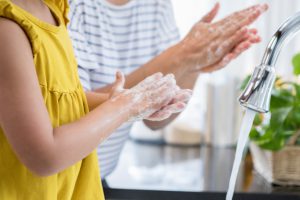Clean Hands: A Key Part of Preventing Infections
Posted on by
Sterling Hill
Health Communication Specialist Contractor
Division of Cancer Prevention and Control
Handwashing is one of the most important things you can do to protect yourself from getting sick. Getting an infection can be especially dangerous if you are a cancer patient getting chemotherapy treatment because you may not be able to fight off infections as well as you could before starting chemotherapy. Frequent handwashing is also crucial for people around you, like family members, doctors, and nurses. Handwashing is particularly important for people with cancer in preventing the virus that causes COVID-19 since they are at increased risk for severe illness.
National Handwashing Awareness Week is December 6 -12 this year! In honor of this week, learn the right way to wash your hands. This is especially important as you and members of your household get ready to prepare meals for the holiday season.
Five Steps for Effective Handwashing
It’s necessary for you to know the proper way to wash your hands. Follow these 5 steps to make sure you clean your hands effectively:
- Wet your hands with clean, running water (warm or cold), turn off the tap, and apply soap.
- Lather your hands by rubbing them together with the soap. Lather the backs of your hands, between your fingers, and under your nails.
- Scrub your hands for at least 20 seconds. Need a timer? Hum the “Happy Birthday” song from beginning to end twice.
- Rinse your hands well under clean, running water.
- Dry your hands using a clean towel or air dry them.
It’s Food Time!
Now that you know how to wash your hands, learn about how to prepare food the right way. Cooking is a large part of the holiday season. If you’re cooking, wash your hands and make sure others wash their hands too. Clean all surfaces frequently as well. This helps prevent germs from spreading around your kitchen and to other foods. Here are some key times to wash hands while you’re in the kitchen:
- Before, during, and after preparing any food.
- After handling raw meat, poultry, seafood, and eggs.
- Before eating.
- After touching garbage.
- After wiping counters or cleaning other surfaces with chemicals.
- After touching pets, pet food, or pet treats.
- After coughing, sneezing, or blowing your nose.
What about Gloves?
Even if you’re wearing gloves, you need to wash your hands. Make sure you wash your hands before and after using gloves to prevent spreading germs. It’s possible to contaminate gloves with germs from your hands when you put them on. Contaminated gloves can also spread germs to your hands when you take them off.
Other Key Times to Wash Hands
Keep up the good habits after the holiday season is over! Here are other key times to wash your hands when you’re not cooking or eating a delicious meal:
- Before and after caring for someone at home who is sick with vomiting or diarrhea
- Before and after treating a cut or wound or caring for your catheter, port, or other access device
- After using the toilet
- After changing diapers or cleaning up a child who has used the toilet
- After blowing your nose, coughing, or sneezing
- After touching an animal, animal feed, or animal waste
- After handling pet food or pet treats
- After touching garbage
Make washing your hands a top priority as you strive to keep infectious away and live a thriving life, especially during chemotherapy treatment!
More Information
When and How to Wash Your Hands
Preventing Infections in Cancer Patients: Clean Your Hands
Handwashing: A Healthy Habit in the Kitchen
Coronavirus Disease 2019 (COVID-19): People with Certain Medical Conditions
Posted on by

